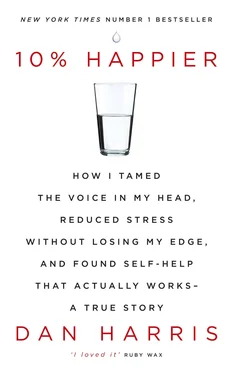After months of drift, in July of 2011 I finally decided to act.
I emailed Ben to schedule a chat, and a few days later I was in his corner office, ready to see if I could fix this thing. Between where I sat on the couch and Ben’s chair was a large coffee table covered in snacks, including tall glass jars filled with pretzel sticks and licorice. There was even, curiously, a bunch of bananas. He joked that he liked to see how people managed to peel and eat a banana in front of their boss.
I assumed he’d be expecting me to come at him with a litany of complaints, so after a lot of strategizing with Bianca, I decided to take a different tack. “I’m concerned,” I said, “that you do not see me as part of the A-team, and I want to know how I can change your mind.”
His response was a thing to behold. I could practically see the wheels in his head turning as he calibrated, then recalibrated, his approach. After maybe five seconds of buffering, he launched into his speech.
“First of all,” he said, “you’re wrong. I do see you as a major player.”
But, he went on, there were some real problems I needed to address. Chief among them: I wasn’t hustling and getting on TV enough. He said, “I think you’ve fallen into that classic weekend-anchor trap where you have your little pocket of airtime on Saturday and Sunday, and then the rest of the week you’re nowhere to be seen.” This was unquestionably true. “You need to up your game,” he declared.
The second issue was weekend GMA . Too often the show was going off the rails, he said, with our anchor banter devolving into silliness. I needed to play a larger role in getting this under control. “I need you to be a leading man,” he said. When I put up a mild protest, arguing that I didn’t want to be bossy or imperious, Ben—who knew I’d become a meditator—looked me dead in the eyes and said, in a tone that was both playful and serious, “Stop being so Zen.”
In mere minutes he had pinpointed and pronounced my errors. Behind the fig leaf of being a good yogi, I had gone so far down the path of resignation and passivity that I had compromised the career I had worked for decades to build. It was just as my dad had feared; I had become ineffective. What I should have done when faced with this adversity was buckle down and work harder. Instead, I had confused “letting go” with going soft.
It was my toughest and most productive professional meeting since that encounter with my boss back at the local station in Boston who told me I was being an asshole. Except this time, ironically, the problem was almost diametrically the opposite.
Serendipitously, on the very night of my meeting with Ben, I had scheduled a dinner with Mark Epstein. In the taxi on my way downtown I called Bianca and told her how it’d gone.
“He’s right,” she said. Which came as no surprise; Ben had basically affirmed her thesis. “This is good. Now you know what you need to do.”
Mark and I met to eat at a fussy Japanese restaurant called Brush-stroke, where they only served a tasting menu and the waiters took themselves very, very seriously. Once we’d placed our orders, I told Mark what had just gone down in Ben’s office. He responded with a catchy little suggestion: “Hide the Zen.”
“People will take advantage of you if they’re reading you as too Zen,” he said. “There’s a certain kind of aggression in organizational behavior that doesn’t value that—that will see it as weak. If you present yourself too much like that, people won’t take you seriously. So I think it important to hide the Zen, and let them think that you’re really someone they have to contend with.”
But I was attached to my rep as a Zen guy. “I don’t want to be an asshole at the office.”
“No,” he said. “That’s the tricky thing about what he’s saying to you. I’m sure there’s a way of doing it where you don’t have to be an asshole. I think it might be possible that you could give the appearance of being one of those guys while deep inside of you, you wouldn’t be.”
I had fallen, he said, into several classic “pitfalls of the path.” People often misinterpreted the dharma to mean they had to adopt a sort of meekness. Some of Mark’s patients even stopped using the word “I,” or disavowed the need to have orgasms during sex. He recalled scenes from his youth when he and meditation buddies would have group dinners at restaurants and no one would have the gumption to place an order. They didn’t want to express a personal preference, as if doing so was insufficiently Buddhist. Another pitfall was detachment. I thought I was being mindful of my distress when I was left out of the big stories, but really I was just building a wall to keep out the things that made me angry or fearful. The final pitfall to which I’d succumbed was nihilism: an occasional sense of, “Whatever, man, everything’s impermanent.”
At this point, the waiter came by to deliver an extremely long description of the dish that had just been placed in front of us. “For your next course you have the grilled anagi , which is freshwater eel . . .”
As he prattled on about kabocha squash and “large, translucent bits of daikon radish,” the nature of my missteps became radiantly clear. The Sufi Muslims say, “Praise Allah, but also tie your camel to the post.” In other words, it’s good to take a transcendent view of the world, but don’t be a chump. Joseph often told a story about his first meditation teacher, an Indian guy named Munindra, who used to advise all of his students to keep things “simple and easy.” One day, Joseph came upon Munindra in the village marketplace, haggling fiercely over a bag of peanuts. When confronted about this apparent contradiction with his simple-and-easy mantra, his teacher explained, “I said be simple, not a simpleton.”
When the waiter left, I said, “This is really humbling.”
Mark, always eager to put things in the best possible light, said, “I think it’s like a revolution in your understanding of this material—a deeper understanding. This makes it so much more alive.”
“Right. Right,” I said. “Because when everything’s going well and you’re being mindfully aware of stuff, that’s pretty easy.”
“That’s easy! This is, like, a real conundrum.”
The same conundrum I’d been fixated on for years, in fact—the balance between Buddhist principles and ambition. It was, I mused aloud, frustrating after all this time not to have the answer. As I sat there feeling bad for myself, it slipped right past me when Mark offered up that he actually did have an answer. It was simple, brilliant advice, but I was too preoccupied to hear it.
Nonetheless, back on the job, things began to improve. At the top of the to-do list I kept in my BlackBerry, I wrote down my marching orders from the meeting with Ben: “UP YOUR GAME,” and “LEADING MAN.” I’d never been one for this type of sloganeering—I liked my mottoes to be a touch more arch—but having these exhortations blaring out at me in all-caps every time I checked the list was extremely useful.
I started saying yes to every assignment that came my way, no matter how small—the way I used to do when I was an eager cub reporter. It did not go unnoticed. A mere three days after our meeting, the emails started coming again, the first about my writing in a GMA piece on the phone-hacking accusations rocking Rupert Murdoch’s British newspaper empire:
Metastasizing scandal . . .
V deft, Dan.
Good to see you on GMA (and everywhere since our talk:)
I covered the arrest of the so-called “Craigslist killers,” who allegedly lured their victims through a help-wanted ad; I reported from a hospital on Staten Island where they had to send away all their patients because Hurricane Irene was bearing down; I covered the child sex abuse allegations that brought down legendary coach Joe Paterno at Penn State, where I got pepper-sprayed on camera during student riots.
Читать дальше












